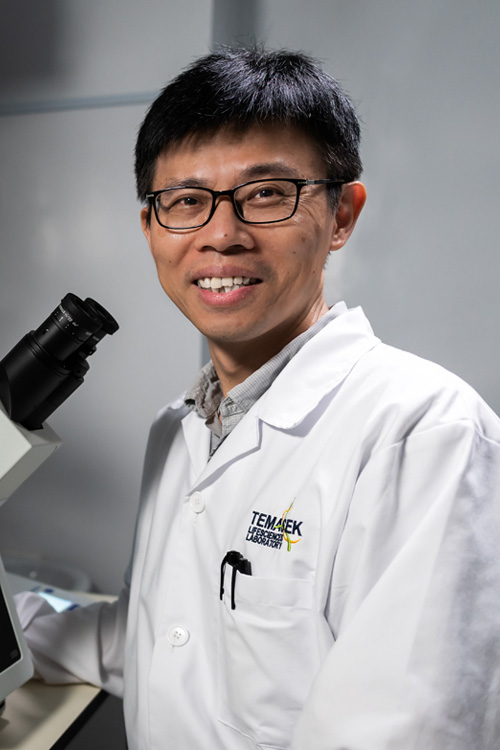
Impact
The lab leverages Drosophila melanogaster as a model organism to investigate fundamental aspects of insect development, reproductive biology, and population control. This knowledge is applied to study the biology of Aedes aegypti mosquito, aiming to improve existing vector control strategies and develop novel bio-control methods to mitigate mosquito-borne diseases.
Collaborations, Achievements & Honours
- Developing novel Wolbachia-infected Aedes mosquito strains in collaboration with Singapore’s National Environment Agency (NEA).
- Identified several plant-derived compounds with potent repellent activity against mosquitoes and other pests.
- Pioneered a two-component ”Hatch and Kill” method to eliminate quiescent Aedes egg bank.
- Established a highly efficient microinjection platform for insect embryos and a robust Wolbachia transinfection platform.
Research Areas
Insect Development, Genetics, and reproduction (Aedes aegypti and Drosophila melanogaster), Infectious Diseases and Vector Biology, Wolbachia-insect interactions
Affiliations
- Senior Principal Investigator, Temasek Life Sciences Laboratory (TLL).
- Adjunct Associate Professor, Department of Biological Sciences, National University of Singapore (NUS).
Question
1. What methods can be employed to more effectively reduce the prevalence of mosquito-borne diseases?
2. How can innovative biological approaches be developed to control Aedes aegypti populations?
Approach
Mosquito-borne diseases impose significant social and economic burdens worldwide. Cai Yu’s lab applies cutting-edge insect genetics to reduce mosquito populations, with a particular focus on female mosquitoes, as targeting them is a highly effective vector control strategy.
Leveraging the genetic and developmental similarities between Aedes aegypti and Drosophila melanogaster – the best-studies insect model – the lab explores the reproductive biology of Aedes mosquitoes to design innovative vector control methods.
Key areas of focus include:
- Understanding the biology of Aedes mosquitoes, including its development and reproduction.
- Developing genetic tools for studying Aedes
- Utilizing the symbiotic bacteria Wolbachia for mosquito population control and understanding Wolbachia-mosquito interactions.
- Optimizing the sterile insect technique (SIT) for vector control.
- Developing bio-friendly insect repellent formulations.
- Creating innovative methods, such as the elimination of mosquito egg banks, to prevent the spread of arboviruses.
The lab also investigates stem cell biology using Aedes aegypti and Drosophila melanogaster as models. Stem cells, responsible for generating diverse cell types and maintaining tissue homeostasis, are studied in the context of germline, neural and intestinal stem cells in Drosophila. These insights are then applied to develop genetic and molecular tools for controlling mosquito germline and midgut functions as part of vector control strategies.
Bio
Cai Yu obtained his Bachelor of Sciences from Xiamen University, China in 1993, and his Ph.D. from National University of Singapore (NUS) in 2003, working under the guidance of Bill Chia and Yang Xiaohang at the Institute of Molecular and Cell Biology (IMCB). After completing a year of postdoctoral research in the same lab, he joined Temasek Life Sciences Laboratory (TLL) as a Young Investigator in 2004. He is currently a Senior Principal Investigator in TLL and Adjunct Associate Professor at NUS.
Senior Principal Investigator
Cai Yu
The lab focuses on fundamental biological questions related to insect (Aedes aegypti and Drosophila melanogaster) development and innovative vector control strategies.
Current Vacancies
-
Dr Cai Yu Group: Assistant Research Officer
7 February 2025 -
Dr Cai Yu Group: Postdoctoral Position
21 October 2024
Group Publications
-
Attenuation of neurovirulence of chikungunya virus by a single amino acid mutation in viral E2 envelope protein
Chen H, Phuektes P, Yeo L, Wong Y, Lee C, Yi B, Hou X, Liu S, Cai Y and Chu J.17 January 2024 -
Different mechanisms of X-ray irradiation-induced male and female sterility in Aedes aegypti
Zhang H*, Trueman E* Hou X*, Chew DX, Deng L, Liew J, Chia T, Xi Z, Tan CH# and Cai Y# (* co-first author, # co-correspondence).27 November 2023 -
Flavivirus genome recoding by codon optimisation confers genetically stable in vivo attenuation in both mice and mosquitoes
Chin WX, Kong HY, Zhu XY, Teo ZY, Faruk R, Lee CH, Ho SX, Aw ZQ, Yi B, Hou X, Tan KY, Yogarajah T, Huber R, Cai Y, Wan Y, and Chu JH.26 October 2023 -
Pipsqueak family genes dan/danr antagonize nuclear Pros to prevent neural stem cell aging in Drosophila larval brains
An H, Yu Y, Ren X, Zeng M, Bai Y, Liu T, Zheng H, Sang R, Zhang F, Cai Y, Xi Y.17 May 2023 -
Aedes aegypti exhibits a distinctive mode of late ovarian development
Zhang H, Goh FG, Ng LC, Chen CH and Cai Y.24 January 2023 -
The Integrator complex desensitizes cellular response to TGFbeta/BMP signaling
Liu S, Baeg GH, Yang Y, Goh FG, Bao H, Wagner E, Yang X, Cai Y*.14 January 2023 -
Camptothecin Effectively Regulates Germline Differentiation through Bam–Cyclin A Axis in Drosophila melanogaster
Zhang J, Zhang S, Sun Z, Cai Y, Zhong G and Yi X.13 January 2023

